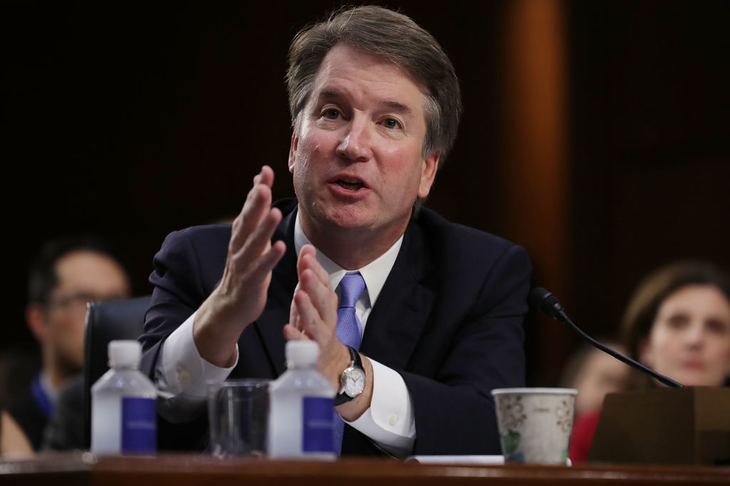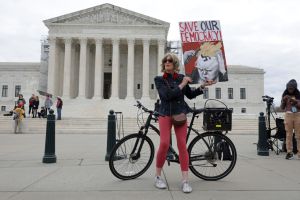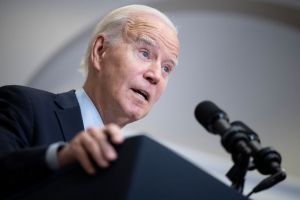‘There’ll be another woman.’ A friend of mine who has been in political journalism much longer than I have told me this weekend to expect another accuser against Brett Kavanaugh to come forward — and sure enough, the New Yorker on Sunday revealed one.
Deborah Ramirez alleges that when they were students at Yale, a drunken Kavanaugh exposed himself to her at a party and touched her with his penis. As yet, however, Ronan Farrow and Jane Mayer write, ‘The New Yorker has not confirmed with other eyewitnesses that Kavanaugh was present at the party.’
My friend who predicted this did not do so because he thinks there’s truth in the claims against Kavanaugh, but because it seemed to him like a golden political opportunity for Democrats and progressives: with a delay in the vote on Kavanaugh’s confirmation, there was time to dredge up rumours and unconfirmed accounts. Even if nothing could be proved, the pile-on might be enough to sink Kavanaugh’s nomination.
A week ago, Kavanaugh’s fate depended on what would be said by the other three people who were supposedly present at the party where Christine Blasey Ford says she was sexually assaulted by Kavanaugh. Since then, none of the three has supported her account of events. They include two prep school friends of Kavanaugh’s – Mark Judge and Patrick J. Smyth – and one long-time friend of Ford’s, Leland Keyser. None remembers attending a party with Kavanaugh and Ford, and Keyser, through her lawyer, has told the Senate Judiciary Committee that she does not even know Kavanaugh. (Keyser has, however, told the Washington Post she believes Ford’s allegation, even if she cannot help to confirm it.)
Now the race is on to substantiate Ramirez’s accusation, which Kavanaugh has denied as firmly as Ford’s. Even if nothing comes of the new claims, things will get worse for Kavanaugh this week when Ford testifies on Thursday. He has adamantly denied assaulting her, but he does not deny knowing her, and whatever memories he has of his activities around 1982 are going to be put to the test. Was he ever at any party whatsoever with Ford? Did he ever get blackout drunk, as his friend Judge did? Did he ever pressure a girl for sex?
The answers to any of those questions may not be enough to prove Ford’s claims, but if he says anything that can be shown to be incorrect, he’ll be accused of lying. Accurate answers, to the extent his memory can provide them, are unlikely to provide much of a character defence, either: of course he got drunk and chased girls, and Ford may easily have been present at some gathering where Kavanaugh was as well. It’s a fair distance from any of that to what Ford or Ramirez has accused him of – most teens who get drunk in the company of the opposite sex still don’t expose themselves or pin down a girl and tear at her clothes – but the picture will be one in which it’s easy to imagine sexual misbehaviour, with or without solid evidence of the allegations in question.
The fight over Kavanaugh’s confirmation has become so polarising that Republicans who might otherwise have been expected to waver, such as Maine’s Susan Collins, have instead held firm until now. Kavanaugh polls badly with the public, but Senate Republicans have more to fear from their own party’s base than they do from general-election voters, as Jeff Flake or Bob Corker can attest. There is no Republican feminist pressure group that wields any power in primaries. By contrast, the conservative groups that support Kavanaugh are mighty indeed. The GOP needs their votes more even in a general election than it does the votes of anti-Kavanaugh voters who are already, almost certainly, anti-Trump voters.
These political calculations won’t matter if any of the claims against Kavanaugh are proved. The harder question is what happens if Ramirez’s allegation proves as hard to verify as Ford’s. Many progressives have argued on social media that doubts alone should be enough to force Kavanaugh to withdraw — after all, he’s not going to be sent to jail, he’d only miss out on a higher judicial post. (The highest of all, of course.) This line has so far only been advanced by people who would obviously like to defeat Kavanaugh for political reasons. However sincere their argument might be, it aligns rather too perfectly with their self-interest.
Kavanaugh must live or die by the facts. Ramirez’s account, like Ford’s, involves enough purported witnesses that some corroboration ought to be possible. The Supreme Court nominee’s political enemies might want to argue that where there’s smoke, there’s fire: if multiple women have made accusations, it must mean there’s some truth to them—regardless of whether either account (or any others that might emerge) is individually proved. The Republicans can just as easily say the opposite, however: the more offences that Kavanaugh is supposed to have committed, the more witnesses and evidence there should be. If nothing and no one to support the accusations can be found by the time Ford testifies, they’ll say that shows there’s nothing to be found. Kavanaugh has already been vetted by an FBI background check, after all.
What won’t help Kavanaugh are the kinds of arguments that many right-leaning pundits have made over the past week in response to Ford’s claims – arguments ranging from attempted rape is just ‘horseplay’ to ‘anything you do at age 17 should be forgiven’ to the masterpiece of misjudgement unleashed upon Twitter by the Ethics and Public Policy’s Center’s Ed Whelan. In the spirit of Alex Jones and QAnon, or O.J. Simpson hunting for his ex-wife’s ‘real killer,’ Whelan used yearbook photos of boys with bad 1980s haircuts, Google Maps, and floor plans of suburban Maryland houses to concoct a tale in which Christine Blasey Ford’s account is completely true, only it wasn’t Kavanaugh who assaulted her, but his doppelgänger— a completely different, and not all that the similar-looking, Georgetown Prep student whom Whelan identified by name. Ford shot down Whelan’s Sherlock Holmes act by saying she knew the other student in question, and she knew he hadn’t touched her.
The common thread in the backfiring defences of Kavanaugh is that they assume his guilt, or if not his own guilt then his evil twin’s. For reasons that are unfathomable, the facts — which have tended to support Kavanaugh up to now— are not enough: a certain segment of Republican punditry believes Kavanaugh or his clone must have done exactly what Ford has accused him of doing. Taking Ford’s account for granted, the defenders then grasp for ways to dismiss its obvious meaning, either by minimising the offence or by replacing Kavanaugh with a body double.
This is madness. If Kavanaugh did something along the lines of what Ford has claimed, but he didn’t mean it the way she has suggested, he would still — even in the most generous reading — have a problem for lying about it afterwards. If he and Mark Judge were engaged in mock-sexual ‘horseplay’ with a girl, his defence would have to rest not on categorical denial, but on admitting to what happened while changing its characterisation. That is not the defence Kavanaugh has entered.
As for the idea that attempted rape is just youthful hijinks or that 17-year-olds aren’t morally culpable for sexual assaults — words almost fail. A 17-year-old is not a child, even if he is a legal minor. The inability to make common-sense distinctions here is a source of grave ethical confusion. It is well-nigh impossible to imagine a 17-year-old of ordinary intelligence who does not understand that assault is wrong. The law is a crude instrument: by default it treats someone a day away from his 18th birthday as categorically different from that same person a day later. But the more serious the offence, the less reason there is to let this legal limitation divert the course of justice, which is why juvenile offenders can be tried as adults in various circumstances. If the law can admit that much common sense, there is no excuse for being less realistic in the court of moral judgement. That court can indeed recognise that in most respects 17-year-olds are closer to being 18-year-olds — or 80-year-olds — than they are to being 8 or 12 or even 14-year-olds. (In the case of Ramirez’s claims, it seems Kavanaugh would have been 18 anyway. But 17 or 18, actual assaults, if proved to be true, cannot be brushed away.)
The ‘doppelgänger’ theory, meanwhile, could only ever have made sense to the extent that one was willing to dispute Ford’s account: that she could have every detail right except the most important one, as in Whelan’s theory, is too politically convenient by half. There is nothing to say that Ford could not be misremembering a real event that did not involve Brett Kavanaugh — but if she is misremembering his involvement, the odds are good that she is misremembering other elements as well, especially considering that no one else she has named recalls anything like what she has described.
Kavanaugh is back where he was a week ago, his fate depending on what, if anything, can be verified about an accuser’s account of something that may or may not have happened more than 30 years earlier. Should the answer prove to be little or nothing, the only question left will be how much nerve Senate Republicans possess. The last thing Kavanaugh needs if he’s innocent are interventions by foolhardy pundits whose arguments only make him look guilty.


















